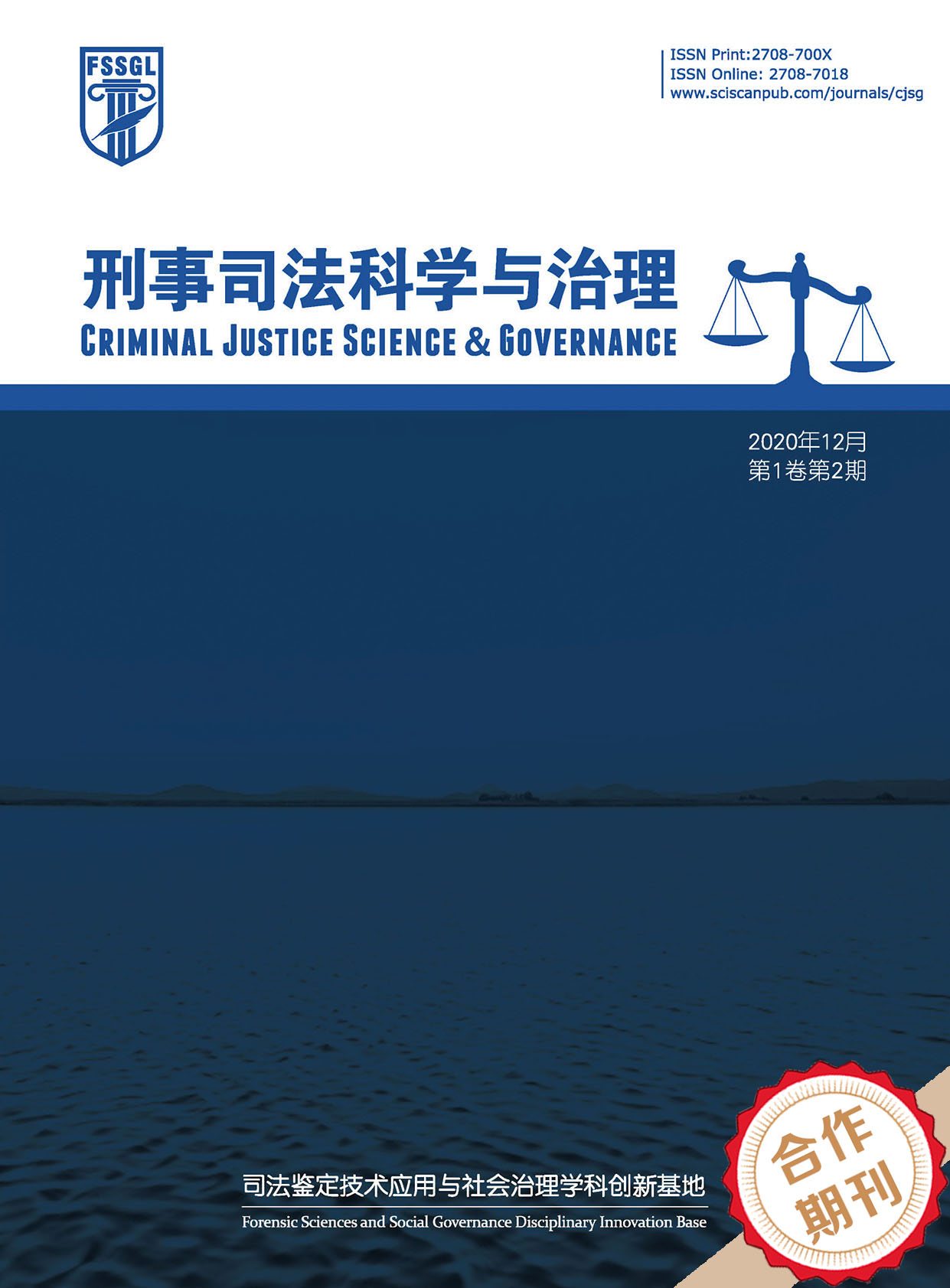Criminal Justice Science & Governance
轻罪治理背景下的犯罪附随后果研究
A Study on the Consequences of Crime in the Context of Misdemeanor Governance
- Authors: 王海帆
-
Information:
中南财经政法大学刑事司法学院,武汉
-
Keywords:
Consequences of crime; Misdemeanor governance; Criminal record犯罪附随后果; 轻罪治理; 犯罪前科
- Abstract: Since the promulgation of the Ninth Amendment to the Criminal Law, China has added a large number of misdemeanors under the guidance of the positive concept of criminal law, and the scope of misdemeanors has been continuously expanded, so it can be said that our country has officially entered a new era of misdemeanor governance. As an invisible punishment measure, the collateral consequences of crime still exist widely in various forms, and there are three main positions in the criminal law academic circles on their nature: The theory of security sanctions, the theory of administrative punishment and the theory of qualification punishment. Therefore, it is necessary to systematically clean up and standardize the system and avoid moving towards a “strict and severe” criminal structure. Define the sources of incidental consequences of crimes in the upstream field, and clarify the methods for applying the collateral consequences of crimes; Improve the mechanism for sealing criminal records in the midstream sector, and determine the principle of competing application of legal provisions; In the downstream field, it is forbidden to arbitrarily inquire into criminal records, and an effective remedial mechanism is to be established. 自《刑法修正案(九)》颁布以来,我国在积极性刑法观的指导下大量增设轻罪,轻罪范围不断扩大,可以说我国已经正式进入了轻罪治理的新时代。犯罪附随后果作为一种隐形的惩罚措施,仍以各种形式广泛存在。对于其性质,刑法学界主要存在保安处分说、行政处罚说和资格刑说三种立场。细究下来,每种学说都有不足之处,这主要是因为当前我国的犯罪附随后果存在诸多不规范之处。因此,有必要对该制度进行系统性的清理与规范,避免走向“又严又厉”的犯罪结构。在上游领域限定犯罪附随后果来源,明确犯罪附随后果适用方式;在中游领域完善犯罪记录封存机制,确定法条竞合适用原则;在下游领域禁止任意查询前科,建立有效救济机制。
- DOI: https://doi.org/10.35534/cjsg.0601011
- Cite: 王海帆.轻罪治理背景下的犯罪附随后果研究[J].刑事司法科学与治理,2025,6(1):97-105.
一、引言
(一)轻罪概念的界定
何为轻罪?我国刑法上虽然并没有明确轻罪与重罪的界定标准,但在表述上仍然作出了区分。例如,刑法中所存在的“情节较轻”“犯罪较轻”的表述,又如刑法第48条中“罪行极其严重”,第56条“严重破坏社会秩序的犯罪分子”等表述。轻罪和重罪的区分概念主要源自域外,对此大陆法系刑法与普通法系刑法存在不同的区分标准。
大陆法系刑法中,《法国刑法典》与《德国刑法典》均采取了罪分三类的立法模式,即将犯罪分为重罪、轻罪与违警罪,但在区分标准上又有所差异。1994年《法国刑法典》第111—1条将轻罪界定为科处最高刑为10年监禁或者罚金至少为25000法郎的矫正刑的犯罪;而根据1998年《德国刑法典》第12条的规定,轻罪是指最高刑为1年以下自由刑或科处罚金刑的犯罪。不难发现,大陆法系的主要两个国家对轻罪的界定存在较大的差异,这主要是由本国文化传统、立法理念和现状需要所决定的。
普通法系刑法中,早期英国普通法将犯罪分为叛国罪、重罪或轻罪,对于重罪和轻罪的区分主要是以列举形式进行的,轻罪主要是指伪证、共犯、诽谤等。随着《1967年刑法法案》的颁布,英国普通法对重罪和轻罪的区分开始由实体视角向程序视角转化,取而代之的是可逮捕犯罪和不可逮捕犯罪的区分,或被称为可起诉犯罪和即决犯罪。前者是指案情重大,只有逮捕起诉才能进行审判;后者指的是罪行轻微,无须逮捕审判,即决审判即可。
关于我国刑法对于轻罪概念的界定,由于没有成文的规定,因此主要是在理论上予以界定。刑之轻重决定罪之轻重,大部分学者认为应当将法定刑最高刑为三年以下有期徒刑或拘役的犯罪归为轻罪。例如,张明楷教授认为当前我国刑事法律条文体现了以三年有期徒刑为界限区别对待的立法意蕴。我国刑法第7条第1款规定:“中华人民共和国公民在中华人民共和国领域外犯本法规定之罪的,适用本法,但是按本法规定的最高刑为三年以下有期徒刑的,可以不予追究。”再如我国刑事诉讼法第216条规定:“适用简易程序审理案件,对可能判处三年有期徒刑以下刑罚的,可以组成合议庭进行审判,也可以由审判员一人独任审判;对可能判处的有期徒刑超过三年的,应当组成合议庭进行审判。”也有学者认为应当以五年有期徒刑为界限来区分轻重罪,其主要理由是我国刑罚整体设置较高,因此重罪的标准也应提高。但是随着近年来不断扩增最高刑为三年以下有期徒刑的犯罪,这一观点事实上已鲜有人接受。
需要指出的是,有学者认为,我国刑法视域下对于轻罪的理解,最大问题不在于区分标准,而在于是否应当区分纯正的轻罪和不纯正的轻罪。纯正的轻罪是指最高法定刑为三年以下有期徒刑的犯罪;不纯正的轻罪是指最高刑不一定是三年以下有期徒刑,但是在法定刑的设置上存在三年以下有期徒刑刑期的犯罪。前者例如危险驾驶罪,后者例如盗窃罪。纯正的轻罪和不纯正的轻罪存在明显区别,不能混为一谈,尤其是在轻罪治理背景下所提出的刑事政策应当具有针对性。例如,针对纯正的轻罪应提出的是犯罪化或非犯罪化的刑事政策,针对不纯正的轻罪应提出的是刑罚严厉化或刑罚轻缓化的刑事政策。
(二)轻罪治理的实践悖论
持积极刑法观的学者一般认为刑法应当积极回应社会需要,指出“刑法是社会的一面镜子。有什么样的社会就有什么样的犯罪,相应地就有什么样的刑法”。持消极刑法观的学者一般认为刑法不应当过度干预社会治理,不应当过度开设轻罪,不宜扩大犯罪圈。两种观点的主要理由在此不加以赘述。要说明的是,就目前而言,积极刑法观占据主流,并且随着《刑法修正案(九)》及后续修正案的颁布实施,轻罪范围不断扩张,传统由行政法规、民事法规调整的行为,如代替考试、高空抛物等行为,也被纳入刑法的调整范围中,这也表明了立法趋势的转化。
然而,在轻罪治理的现实实践中,轻罪的增设使得犯罪数量,尤其是轻罪犯罪数量大幅增加。2023年《最高人民检察院工作报告》指出:“2018年至2022年,全国检察机关共办理各类案件1733.6万件,比前五年上升40%。”“对犯罪较严重的起诉17.9万人,比前五年下降36.9%。”在总的案件数量大幅提升的前提下,对犯罪较严重的起诉大幅减少,不难发现轻罪数量在很大程度上大于重罪数量。以纯正的轻罪危险驾驶罪为例,2013年—2017年,全国检察机关对危险驾驶罪的起诉数量占整个起诉案件的10.27%,2019年占比17.7%,2021年起诉35.1万人,占比20.07%。有学者统计,2013年以来被判处3年以下有期徒刑的案件比例,除了2017年以外,均超过了80%。积极刑法观认为轻罪治理能够使我国的刑法规制体系转向更符合刑法谦抑性的“严而不厉”的结构,是刑罚轻缓化的推动。但如此庞大的犯罪数量使得社会中相当一部分人被打上“犯罪分子”或“犯罪分子家属”的标签。不同于重罪,轻罪所带来的犯罪附随后果可能会比刑罚本身给轻罪犯罪人带来更为巨大的痛苦,致使轻罪不轻。由于我国独特的政治、文化和意识形态,社会长期对有犯罪记录的人带有偏见,最常见的便是对其自身和近亲属的职业限制。诚然,一定的犯罪附随后果能够提高刑法的威慑功能,对于预防再犯具有积极作用,但在轻罪时代中,过于严苛的犯罪附随后果会形成一种直接后果与间接后果“倒挂”的不正常现象。
二、犯罪附随结果的适用现状考察
(一)我国犯罪附随后果的表现形式
1. 资质型犯罪附随后果
资质型犯罪附随后果主要是指对犯罪人(或其近亲属)从事某种职业或担任某种职务的资格进行限制或剥夺的犯罪附随后果,主要包括以下几种类型:
第一,不得担任公职人员。所谓公职人员即依法履行公共职务的各类国家机关、各人民团体以及国有企业、事业单位的工作人员,其主要是通过在录用时进行“政审”或接受刑事处罚后开除公职两种方式予以实现的。例如,2022年《上海公安机关警务辅助人员管理条例》第13条规定:“受过刑事处罚或者涉嫌犯罪尚未查清的,不予聘用为辅警。”
第二,不得担任某些法人或组织管理人员。由于部分法人或组织的管理人员肩负着较大的社会责任,其管理行为涉及公共利益,对国家的经济金融稳定具有举足轻重的作用,因此有规范性文件也对这些管理者岗位设置了相关要求。例如《中华人民共和国公司法》第一百四十六条第一款第(二)项规定:“有下列情形之一的,不得担任公司的董事、监事、高级管理人员:(二)因贪污、贿赂、侵占财产、挪用财产或者破坏社会主义市场经济秩序,被判处刑罚,执行期满未逾五年,或者因犯罪被剥夺政治权利,执行期满未逾五年。”
第三,不得从事特定社会性职业。所谓社会性职业是指这些职业的从业者的行为对公众或社会的利益具有较大的相关性,社会公众对其从业行为具有较高的要求。例如,《江西省应急管理厅关于2022年面向社会公开招聘江西省航空应急救援特勤队员的公告》第2条规定:“因犯罪受过刑事处罚的,不具备航空应急救援特勤队员的报考资格。”
2. 利益型犯罪附随后果
利益型犯罪附随后果主要是指对犯罪人(或其近亲属)获取某种物质性利益、奖励或精神性利益、荣誉的限制或剥夺,主要包括以下几种类型:
第一,限制或禁止资金扶持待遇。例如《藤县人民政府办公室关于印发藤县2020年城乡居民最低生活保障工作实施方案的通知》第3条规定:“参与……等违法活动且屡教不改的,其本人不能享受低保待遇。”
第二,撤销荣誉称号。例如2017年广东省总工会印发的《广东省五一劳动奖状、奖章评选管理工作暂行办法》第二十条规定:“有下列情形之一者,撤销广东省五一劳动奖章荣誉称号,收回证书、奖章,终止其享受的相关待遇:(二)受到刑事处分的。”
第三,扣减或禁止积分入户。例如2022年上海市人民政府《关于印发修订后的上海市居住证积分管理办法的通知》第九条规定:“持证人有严重刑事犯罪记录的,取消申请积分资格。”
3. 行为型犯罪附随后果
所谓行为型犯罪附随后果是指限制或禁止犯罪人(或其近亲属)实施某种行为或从事某种活动的犯罪附随后果,主要包括以下几种类型:
第一,对民、商事行为的限制。例如《民法典》第一千零九十八条规定:“收养人应当同时具备下列条件:(四)无不利于被收养人健康成长的违法犯罪记录。”
第二,在特定领域作业的限制。例如2018年《天津市印章业治安管理办法》第六条规定:“因故意犯罪受到过刑事处分的,不得从事经营印章业务。”
第三,对考试行为的限制。例如司法部《2022年国家统一法律职业资格考试公告》在报名条件中规定:“有下列情形之一的人员,不得报名参加国家统一法律职业资格考试:1. 因故意犯罪受过刑事处罚的。”
(二)犯罪附随后果的性质
关于犯罪附随后果的性质,刑法学界主要有保安处分说、行政处罚说和资格刑说三种立场。
资格刑说,又被称为刑罚说。这种观点认为犯罪附随后果是一种游离于刑罚体系之外的资格刑,虽无刑罚之名却有刑罚之实,因此又被称为刑罚体系外资格刑。
行政处罚说,又被称为行政责任说。持此观点的学者将刑罚附随结果视为一种行政责任,认为多数犯罪附随后果具有行政责任的性质,如犯罪附随后果中某些从业资格的限制和禁止性规定体现了行政责任的属性。也有学者认为犯罪附随后果是作为一种行政措施而存在的,是行政处罚中的资格刑,主要理由在于行政处罚中存在吊销许可证件或资质的资格刑。
持保安处分说的学者认为犯罪附随后果本质上是一种保安处分,这是当前的通说。保安处分这一概念来源于刑事实证学派,其立足于社会防卫,关注行为人的人身危险性。有学者对其概念作出总结,认为保安处分是指“由法律规定,针对具有实施犯罪或者其他严重危害行为危险的人员适用,以限制或剥夺人身自由、财产利益以及其他重大权益为内容,具有预防功能的处分措施”。例如,刘艳红教授便认为犯罪附随后果作为一种保安处分制度,应当受制于罪刑法定原则。再如,有学者从功能、内容、定位、适用四个方面出发,将犯罪附随后果视为保安处分。同时,不少学者在对“职业禁止令”分析的文章中持有保安处分说的立场,将其视为保障社会公共利益而采取的一项预防性措施,即保安处分。
首先,资格刑说将犯罪附随后果视为“刑罚之实”,但是在实践中,规定犯罪附随后果的规范性文件往往层级较低。而刑罚作为严重限制公民权利的惩戒,根据《立法法》的规定,只能由法律加以规定,“只有法律才能为犯罪规定刑罚。只有代表根据社会契约联合起来的整个社会的立法者才拥有这一权威”。因此,如果按照此观点,那么现存的大量有关犯罪附随后果的规定则有违罪刑法定原则。其次,行政处罚说也有不妥之处。诚然,实践中相当数量的犯罪附随后果确有行政处罚的色彩,但是第一,行政处罚应由行政机关作出,而非司法机关判处刑罚后的附带效果;第二,行政处罚的适用对象一般为违反行政法规的行为人而非犯罪人;第三,行政处罚具有法定的救济途径,而犯罪附随后果却缺乏有效的救济,二者在严厉性上存在较大的差异。最后,保安处分说虽为当前的通说,相较于上述两种学说具有更强的包容性与合理性,但是我国现行《刑法》中并无“保安处分”的概念,它是一个舶来词,不同的学者对其定义也有所不同。同时,我国现有的犯罪附随后果类型繁多,仅仅依靠“保安处分”一词来笼统地加以概括略有牵强。
对犯罪附随后果的性质难以界定的主要原因在于当前有关犯罪附随结果的规定多数缺乏法律根据,野蛮生长并层层加码、逐步严苛。因此,有学者提出删除非刑事领域有关犯罪附随后果的规定,彻底杜绝轻罪不轻的现象。笔者同样赞同这一观点,认为应当对犯罪附随后果进行“清理”,并将部分内容转化为刑法中的资格刑,规范其适用。
三、犯罪附随后果制度与现代法治理念的冲突表现
(一)过于严苛的犯罪附随后果制度有违罪责刑相适应原则
轻罪时代,大量轻罪的犯罪人其本身没有很大的人身危害性,所犯罪行也较轻,甚至在相当一段时间内并不被视为犯罪行为。根据罪责刑相适应原则,对犯罪人判处的刑罚轻重,应当与其所犯罪行的轻重、罪过大小以及应承担的刑事责任大小相当。而现实中,虽然在成文的刑罚规定上贯彻了罪责刑相适应原则,轻罪的刑罚同样较轻,但是在犯罪附随后果上却没有做到有效的区别对待。一名重罪的犯罪人与一名轻罪的犯罪人所承担的犯罪附随后果在很大程度上是相同的。例如,《四川省2022年公共卫生特别服务岗项目实施方案》在规定报考条件时,仅笼统地规定了“曾受到刑事处罚的”不得报考。
(二)犯罪附随后果制度在实体内容和程序适用上均具有恣意性
实体内容上,犯罪附随后果虽然仍属于犯罪后果,但却不由刑法规定,而是散见于其他法律法规、地方性法规、地方政府规章、行业性规定、各类工作文件中。不同的规范性文件在对其内容的规定上各有不同,有的是对权利和资质的限制、剥夺,有的是对某种行为的禁止;有的只涉及犯罪人自身,而有的既涉及犯罪人自身也涉及其近亲属。程序适用上,各类犯罪附随后果往往叠加适用在犯罪人或其近亲属身上。一旦被判决有罪,社会上各类犯罪附随后果往往会不加区分地均对其生效,最终导致犯罪附随后果过于严苛,不利于犯罪人重返社会,不符合现代犯罪治理理念。
(三)犯罪附随后果制度有违罪刑法定与罪责自负原则
前述犯罪附随后果规定的恣意性,导致任何公共部门乃至社会上的普通企业公司,均可以以存在犯罪前科为理由,对犯罪人的权利或者资格进行限制或剥夺。制定主体的多样性会导致处罚的肆意性与不公平现象泛滥。同时,部分规定犯罪附随后果的规范性文件,不仅限制了犯罪人的权利或资质,对其近亲属的权利或资质同样也加以限制,这主要是以“政审”形式出现,广泛存在于入学、就业、入党、入伍时考察其近亲属有无犯罪记录。例如,公安部2020年发布的《公安机关录用人民警察政治考察工作办法》第九条规定:“考察对象的家庭成员具有下列情形之一的,其本人不得确定为拟录用人选:(一)因故意杀人、故意伤害致人重伤或者死亡……受到刑事处罚的。”
(四)犯罪附随后果制度不符合现代权利理念
现代权利理念认为,犯罪治理应当由过去的国家权力单向驱动,转向国家权力与犯罪人权利的良性互动,即在国家权力行使与犯罪人权利保障中寻找平衡与协调,以此实现犯罪治理的最大效益。习近平总书记指出,“坚持在法治轨道上推进国家治理体系和治理能力现代化”,丰富了国家治理和现代化理论。具体到犯罪治理领域便要求尊重和保障权利,既包括一般民众的权利,也包括犯罪人的权利。现代权利理念在我国宪法中也得到了认可与贯彻,《中华人民共和国宪法》(以下简称《宪法》)第三十三条确定了公民的平等权,规定“国家尊重和保障人权”。但在犯罪附随后果制度的实践中,犯罪人除了承受应有的刑罚与必要的社会预防外,同样也承受着基本权利被侵犯的痛苦。无原则的犯罪附随后果造成了一定程度上的不公,犯罪人的一些基本权利和非基本权利与正常公民相比受到了限制,这显然违反了现代权利理念。
(五)部分犯罪附随后果制度与现有法律体系不协调
《中华人民共和国监狱法》(以下简称《监狱法》)第三十七条第一款规定:“对刑满释放人员,当地人民政府帮助其安置生活。”对生活的安置首先需要对职业的安置,只有得到稳定的收入才会减少犯罪人再犯可能性。然而,现有的部分犯罪附随对犯罪人的就业作出了一定限制,便难以与《监狱法》相协调。同时,《监狱法》第三十八条规定:“刑满释放人员依法享有与其他公民平等的权利。”这也是对《宪法》第三十三条的贯彻,但犯罪附随后果对接受刑事处罚后的犯罪人的基本权利和非基本权利作出各种限制,则显然违反了本条规定。
犯罪附随后果制度与刑罚中附加刑同样不协调。一般认为,刑罚是最为严厉的惩罚,其他处罚手段的严厉性均应当低于刑罚。然而,现有的部分犯罪附随后果在严厉性上要明显大于刑罚(这里主要指的是刑罚中的附加刑)。例如,张三一家仅靠张三一人维持生计,张三犯某一轻罪后,若让其从剥夺其职业资质或是判处罚金中选一,张三显然会选择后者。这是因为对于一般人而言,丢掉工作比一定数额的罚金对其个人和家庭具有更大的痛苦性。而且犯罪附随后果往往没有时间限制,一旦犯罪便终身承担,并存在多种犯罪附随后果叠加适用的情形。因此,有学者认为当前的犯罪附随后果由于制度构建的体系性缺陷,对犯罪者的报应力度已超过刑法所设定的责任程度。
四、犯罪附随后果制度的规范路径
非刑事领域的犯罪附随后果规定在我国已有数十年的历史,非一朝一夕可以更改剔除。因此,相较于直接删除相关规定,采取一种更为轻缓审慎的态度,多层次分步骤地对当前不合理的制度和规定进行清理和重塑,更有利于保障公民合法权利,推动中国式刑事司法现代化。
(一)上游领域:限定犯罪附随后果来源,明确犯罪附随后果适用方式
1. 严格限定犯罪附随后果设定来源
《中华人民共和国立法法》(以下简称《立法法》)第十一条规定,犯罪与刑罚、对公民政治权利的剥夺、限制人身自由的强制措施和处罚只能由法律予以规定;第十二条补充强调,上述事项即使尚未制定法律,也不可先行制定行政法规。我国犯罪附随后果为人所诟病的一点在于来源过于宽泛,从法律到地方政府规章,乃至团体规定、行业规定都有相关设定。然而,正如前文所述,犯罪附随后果在严厉性程度上并不低于刑罚,对公民权利的限制或剥夺同样也不低于《立法法》所规定的法律保留事项,因此应当仅由法律予以规定。有学者统计,如果将设定犯罪附随后果的权限仅赋予法律,现行的犯罪附随后果将减少90%以上。因此,笔者建议逐步清理法律层级以下的犯罪附随后果,将限制或剥夺犯罪人从事某些行业或担任某些职务纳入刑法中的资格刑,同时收集其他具有合理性的犯罪附随后果,并抽象化为一般性规定,将其纳入刑法。
主要有以下几点理由:第一,法律在全国范围内有效,可以避免不同地域对犯罪人区别对待而造成不公,并且法律的制定程序较为严格,立法技术更为严谨成熟,可以在较大程度上实现社会预防与权利保障的双向平衡。第二,当前我国刑法对资格刑的规定较为单一,只有剥夺政治权利和驱逐出境,难以适应新时代轻罪治理的现实需要。将职业限制纳入刑罚中的附加刑,也是许多其他国家的通行做法,例如《意大利刑法》第30条就规定了禁止被判刑人从事某一职业或技艺的附加刑。第三,将犯罪附随后果纳入资格刑,可以破解其于法无据的困境,从而更好地适应罪刑法定原则。
2. 确立以必要性和关联性为前提的犯罪附随后果适用机制
犯罪附随后果一般是以风险规制、预防再犯为依据,这一点在外国刑法中有所体现。例如,在英国,只会对福利诈骗犯罪人限制其福利待遇领取资格,而毒品犯罪者仍有资格享有此福利。但是当前我国多数有关犯罪附随后果的规定并未区分不同的犯罪性质与类型,仅以“受过刑事处罚的”“有犯罪记录的”等笼统表述进行规定,这是一种不妥当的“二极管”思维,即简单认定一旦受过刑事处罚就一定是“坏人”,不能享有某些权利。需要指出的是,我国当前也有不少法律关注到犯罪附随后果适用的逻辑关联性,如我国《会计法》第四十条规定,只有犯有与会计职务相关的违法行为且被追究刑事责任的人员才不得从事会计工作。然而,未加以区分就直接规定犯罪附随后果的规范性文件仍占多数,且多为低层级文件。因此,笔者建议将当前不加区别适用犯罪附随后果的方式,改为有区别、个别化的适用方式,并以必要性和关联性为前提,即只有当犯过该种类型犯罪的人确实不适宜从事某种行业或担任一定职务时才适用,或者对当前法律法规中“受过刑罚处罚的”“有犯罪前科的”等相关语句进行统一限缩解释,使其满足必要性与关联性的适用前提。这既是精准化社会预防的需要,也可以避免多种犯罪附随后果叠加适用的不合理现象。
3. 取消犯罪附随后果终身适用的规定
当前,我国的犯罪附随后果往往既没有适用期限的规定,也没有消除事由的规定。这就意味着,一旦犯罪,犯罪人便需要终身承担附随后果,这显然有违罪责刑相适应原则。一般认为,犯罪人在接受完刑罚处罚后,其人身危险性便有所降低,不再具有可罚性,即使是严重犯罪的行为人,在接受多年的刑罚改造后,其危险性也大大降低了,对其适用终身的犯罪附随后果缺乏正当性,更何况在轻罪时代,80%以上的犯罪均为轻罪,终身适用犯罪附随后果显然违反了比例原则。同时,将接受完刑罚处罚的人员终身打上“犯罪分子”的标签,会打击他们改过自新的信心,不利于他们重返社会。因此,笔者建议取消犯罪附随后果终身适用制,对犯罪进行分层,合理确定犯罪附随后果适用期限。例如,对于轻罪,其期限不得超过5年;对于重罪,适用期限应为5年以上、10年以下;独立适用时,从判决生效之日起开始计算,作为主刑的附加刑适用时,从主刑执行完毕或赦免之日起开始计算。
4. 严格限制间接犯罪附随后果的适用
间接犯罪附随后果是与直接附随后果相对应的概念,前者是指对犯罪人近亲属的犯罪附随后果,后者是指对犯罪人自身的犯罪附随后果。如前所述,对犯罪人的近亲属适用犯罪附随后果有违责任主义,缺乏正当性,因此应对其进行严格限制。近来,是否应当废除对犯罪分子子女考公限制引发热议。有网友提出,作为子女,没有办法选择谁做自己的父母,让子女承担父母犯罪的责任有违公平,且网络上大多数人十分赞成这种做法。对此,笔者的意见是应当对这种间接犯罪附随后果进行严格限制。多数人的意见并不代表正确,如果一味听从多数人的意见而不进行理性思考,便有可能走向“多数人的暴政”。这种对犯罪人的近亲属进行惩罚的“连带”机制与思想在中国历史悠久、影响深刻,这种影响在当下依然存在。但是需要清楚地认识到,这种思想与现代刑法理念相背离。因此,笔者建议应当废除绝大部分间接犯罪附随后果,仅保留极少数对于国家安全具有重大必要性的间接犯罪附随后果。例如,行为人故意犯危害国家安全罪,可限制其近亲属担任某些与国家安全和利益密切相关的职务。
(二)中游领域:完善犯罪记录封存机制,确定法条竞合适用原则
1. 构建针对轻罪的犯罪记录封存制度
当前,我国犯罪封存制度仅仅是针对特定的未成年犯罪而设立的。这一制度对于未成年犯罪人的改造和重归社会具有重要意义,取得了显著的司法效果与社会效果。但是随着轻罪时代的到来,这一仅有的犯罪记录封存制度便显得捉襟见肘,难以适应新时代下的犯罪治理。对犯罪附随后果进行限缩,除了要对其自身进行规范外,同样离不开系统化的记录删除和复权制度。事实上,已有不少学者提出要构建符合中国刑事制度的前科消灭制度。有学者认为应当参考域外,对犯罪行为进行分层,构建分级封存制度;同样有学者提出可以将个人信息权益中的被遗忘权引入犯罪记录封存制度中。笔者在此主要从轻罪治理的视域出发,认为在构建轻微犯罪记录消除制度中应当体现以下要点。
第一,犯罪记录封存不应简单地以法定刑或宣告刑为标准确定考验期。多数学者认为应当对犯罪区分类型,分别设置不同的考验期,考验期届满便对犯罪记录予以封存。这种做法当然具有道理,但是仅具有该形式条件是不足的,应当再补充以实质条件,这也是域外其他国家的做法,即犯罪人在考验期内应当表现良好。对于“表现良好”的标准,不同的国家做法有所不同,归结起来主要有三种类型:一是考验期内未犯新罪;二是考验期内未犯某一特定类型的犯罪;三是未犯新罪且履行了特定义务。笔者认为,面对轻微犯罪快速扩张的现状,我国的实质标准可以不必过于苛刻,可以以“考验期内未犯新罪或未发现漏罪”为标准。
第二,当前犯罪记录封存宜仅针对轻罪而言。仅对轻罪实施犯罪记录封存,也就是说在范围上采取一种限定的立场。这是因为犯罪记录封存制度实际上在我国尚处于初步建立阶段,不宜立即适用于所有犯罪,这同样也是社会预防与人权保障相妥协的一种做法,这也是域外部分国家的做法。例如在英国,被判处终身监禁的行为人的前科不得消灭。当然,如何对“轻罪”概念进行界定同样也是值得商讨确定的。
第三,有必要对前科报告制度进行限缩。刑法第一百条第一款规定了受过刑事处罚的人的前科报告义务。那么如果前科人员处于考验期内,那是否具有报告义务呢?笔者认为,既然前科封存制度具有一定的考验期,那么在考验期内实际上是存在“前科”的,当然是具有“前科”报告义务的;但在考验期满,对其犯罪记录进行封存后,他便不存在“前科”了,同样也就不存在“前科”报告义务了。需要指出的是,此处的“前科”特指可查询的犯罪记录,并非事实上没有过犯罪行为。这便可以在一定程度上减轻当前普遍存在的“前科歧视”对犯罪人造成的痛苦。
2. 相关规定竞合时适用非刑事法优先原则
如前所述,在将部分犯罪附随后果纳入刑罚体系并仅保留法律层级的犯罪附随后果规定后,难免会产生其他法律的规定与刑法相冲突的情形。前文笔者所构思的是刑法作出一般性规定,而具体性规定则由法律作出,因此相关法律所规定的犯罪附随后果更具有针对性,这同样也是对我国《刑法》第三十七条之一第三款精神的贯彻。
(三)下游领域:禁止任意查询前科,建立有效救济机制
1. 限制相关主体随意查询犯罪记录
考虑到我国社会长期以来存在着对前科人员“另眼相看”的思想,即使在制度上作出有关要求,也难以避免民间对前科人员的隐形歧视。统计表明,多数用人单位在招录刑满释放人员的问题上态度较为消极。从查询主体上看,主要包括有权机关、用人单位及个人。其中,有权机关具有明确查询的法律依据,而单位和个人的查询依据则较为模糊,这便埋下了单位与个人随意查询犯罪记录的隐患,因此应对其加以一定限制。
对于用人单位,应当限制其任意查询。首先,要明确其可以以法律作为查询理由、依据,例如《刑法》第一百条之规定。其次,笔者认为非法律规定不宜作为单位查询理由、依据,这既是对上文限定犯罪附随后果设定来源做法的呼应,同时也是限制用人单位任意查询犯罪记录的必然之举。最后,要明确单位内部章程不可作为查询理由。如果允许单位内部制定的章程可以授权单位内部相关部门查询员工犯罪记录,那么犯罪记录查询制度便形同虚设。更为重要的是,用人单位在制定单位章程时并不会考虑人权保障、职业相关性、必要性等因素,其更多考虑的是单位声誉,这难免会导致用人单位对前科人员的就业权利造成侵犯。例如,滴滴公司在其内部的《加入滴滴的条件说明和承诺》规定:“注册滴滴司机,应满足以下标准。不满足下列任一标准的用户,请勿注册滴滴司机……无犯罪记录。”
对于个人,应当禁止其任意查询。首先,允许个人查询他人犯罪记录,相当于要求他人自证无罪,这违背了基本的无罪推定原则;其次,允许个人查询他人犯罪记录,是否构成对他人隐私权益的侵犯,这仍是值得讨论的;最后,允许个人查询他人犯罪记录会在社会中大肆营造歧视与仇恨氛围,不利于和谐社会的营造与犯罪人的顺利回归社会。
2. 开辟司法救济渠道
前文所述,犯罪附随后果的严厉性可能并不低于刑罚,但由于当前缺乏有效的救济机制,无论其适用是否合理正确,犯罪人都必须被动承担。因此,对犯罪附随后果的适用应当允许救济。在司法救济和行政救济之间,笔者认为司法救济更为可行。一方面,司法救济的权威性更高;另一方面,行政救济的适用范围较小,缺乏相对的独立性。在犯罪附随后果上,美国通过一系列司法裁判确定了对犯罪附随后果进行实质审查的方式。例如,在美国诉沃德(Ward)案中,美国最高法院便确立了对犯罪附随后果司法救济的标准和依据。在我国,法院虽然无法对法律规范进行实质审查,但是也应当允许前科人员就犯罪附随后果的非法适用提起诉讼,从而保障自身的合法权利,这也是对前科人员法治意识培养的最佳举措。
















